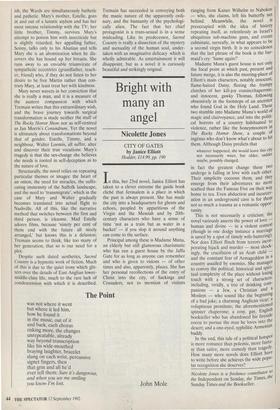Bright with many an angel
Nicolette Jones
CITY OF GATES by Janice Elliott Hodder, £14.99, pp. 190 In this, her 23rd novel, Janice Elliott has taken to a clever extreme the guide book cliché that Jerusalem is a place in which the past is always present. She has made the city into a headquarters for ghosts and echoes, peopled by apparitions of the Virgin and the Messiah and by 20th- century characters who have a sense of time `not as a train but as water in a bucket' — if you slop it around anything can come to the surface.
Principal among these is Madame Muna, an elderly but still glamorous charismatic who has run a guest house by the Jaffa Gate for as long as anyone can remember and who is given to visions — of other times and also, apparently, places. She has her personal recollections of the entry of Christ into the city, of Sackings and Crusaders, not to mention of visitors
ranging from Kaiser Wilhelm to Nabokov ___ who, she claims, left his butterfly net behind. Meanwhile, the novel is preoccupied with the idea of history repeating itself, as relentlessly as Israel's ubiquitous sub-machine guns, and events culminate, surreally, in what appears to be a second virgin birth. It is no coincidence that the last phrase of the book is the bar- maid's cry: `Same again?' Madame Muna's guest house is not only the focal point at which past, present and future merge, it is also the meeting-place of Elliott's main characters, notably innocent, flame-haired Daisy, fleeing the fruriwY clutches of her kill-joy cousin/chaperone, and innocent, gawky Thomas, following obsessively in the footsteps of an ancestor who found God in the Holy Land. These two stumble into Madame Muna's world of magic and clairvoyance, and into the politi- cal horrors of a country habituated to violence, rather like the honeymooners in The Rocky Horror Show, a couple of ingenus who don't know what's about to hit them. Although Daisy predicts that
whatever happened, she would leave this city not necessarily wiser, but older, sadder maybe, possibly changed,
in fact the greatest change these rw° undergo is falling in love with each Other. Their simplicity cocoons them, and they emerge from their adventures no more scathed than the Famous Five on their way home to tea. Even abduction and incarcer- ation in an underground cave is for them not so much a trauma as a romantic oppor- tunity. This is not necessarily a criticism; the novel variously asserts the power of love — human and divine — in a violent context (though in one dodgy instance a marriage is saved by a spot of timely wife-battering). Nor does Elliott flinch from terrors incor- porating hijack and murder — most shock- ingly, the crucifixion of an Arab child — and the constant fear of Armageddon in a country assailed by enemies. She manages to convey the political, historical and spiri- tual complexity of the place without losing touch with a strong set of characters: including, vividly, a trio of drinking com- panions — a Jew, a Christian and a Moslem — who sound like the beginning of a bad joke; a charming Anglican vicar; a voluptuous prostitute; the aforementioned spinster chaperone; a cosy, gay,
English bookseller who has abandoned his fireside cocoa to pursue the man he loves into the desert; and a one-eyed, syphilitic Armenian baddy.
In the end, this tale of a political hotspot is more romance than polemic, more fanta- sy than satire, more comedy than tragedy. How many more novels does Elliott have to write before she achieves the wide popu- lar recognition she deserves?
Nicolette Jones is a freelance contributor to the Independent on Sunday, the Times, the Sunday Times and the Bookseller.


































































 Previous page
Previous page